Iraq closes notorious Abu Ghraib prison because of security concerns

Iraq’s Ministry of Justice announced Tuesday that it would close the facility formerly known as Abu Ghraib prison, the site of an infamous torture scandal under the U.S. occupation.
“The ministry made that decision as part of precautionary measures related to the security of the prisons,” said Justice Minister Hassan Shammari. He did not clarify whether the shutdown is permanent.
Shammari explained that the location of the facility, on the edge of insurgent-dominated areas of Anbar province, west of central Baghdad, has become a “hot spot.”
Islamic militants have been targeting officials from the Shiite-led government and seizing control of parts of Anbar province, which is controlled by Sunni rebels. Iraq’s electoral commission said last week that there will be no voting in the areas of Anbar where security operations are underway.
Now called the Baghdad Central Prison, the jail facility has been emptied of its 2,400 inmates, some of whom were convicted of committing acts of terrorism. They have been sent to other prisons in central and northern provinces, according to the Justice Ministry’s website.
In July 2013, militants launched an attack on the prison, setting free hundreds of inmates including militants affiliated with Al Qaeda. Dozens of other prisoners and security personnel were killed in the melee.
Abu Ghraib became notorious after photographs surfaced in 2004, one year after the invasion, showing Iraqi detainees being humiliated by U.S. soldiers.
U.S. troops pulled out Iraq in 2011, but violence has been surging in the oil-rich nation over the last year.
Tarek, a reporter from Cairo, is a visiting journalist at The Times sponsored by the Daniel Pearl Foundation in partnership with the Alfred Friendly Press Fellowships.
More to Read
Sign up for Essential California
The most important California stories and recommendations in your inbox every morning.
You may occasionally receive promotional content from the Los Angeles Times.










